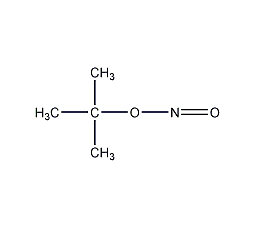tert-butyl nitrite


Structural formula
| Business number | 05KF |
|---|---|
| Molecular formula | C4H6NO2 |
| Molecular weight | 103.12 |
| label |
1,1-dimethylethyl nitrite, Terbutyl nitrite, Alpha, alpha-dimethylethyl nitrite, 1,1-Dimethylethylnitrite, 2-Methyl-2-nitritopropane, Nitrous acid, 1,1-dimethylethyl ester |
Numbering system
CAS number:540-80-7
MDL number:MFCD00002055
EINECS number:208-757-0
RTECS number:RA0802000
BRN number:1209339
PubChem ID:None
Physical property data
1. Characteristics: light yellow oily liquid
2. Density (g/ cm3,25/4℃):0.867
3. Relative vapor density (g/cm3,AIR=1): Not OK
4. Melting point (ºC): Undetermined
5. Boiling point (ºC,Normal pressure):61-63
6. Boiling point (ºC,8kPa): Undetermined
7. Refractive index:1.368
8. Flash point (ºF):-10
9. Specific optical rotation (º): Undetermined
10. Autoignition point or ignition temperature (ºC): Undetermined
11. Vapor pressure (kPa,25ºC): Undetermined
12. Saturated vapor pressure (kPa,55.1ºC): Undetermined
13. Heat of combustion (KJ/mol): Undetermined
14. Critical temperature (ºC): Undetermined
15. Critical pressure (KPa): Undetermined
16. oil and water (octanol/Log value of partition coefficient (water): undetermined
17. Explosion limit (%,V/V): Undetermined
18. Lower explosion limit (%,V/V): Undetermined
19. Solubility:Undetermined
Toxicological data
1, acute toxicity: oral administration to miceLD50: 308mg/kg, liver changes, blood –methemoglobinemia , carbon and oxygen;
Mice inhaledLC50: 10852 ppm/1H, behavior – changes body activity (specific analysis��, Cyanosis of the lungs, chest or respiratory –, increased urine output in the kidneys, ureters, and bladder–; -US>
Mouse transperitoneallyLD50: 187mg/kg,, causing liver and other changes;
Mice inhaledTCLo: 1000 ppm/7H/60D-I, changes in lung weight, changes in liver weight, biochemistry – SPAN>Enzyme inhibits, induces or alters dehydrogenase at blood or tissue levels;
2 , mutagenicity data: MicroorganismTEST Systemic mutations: Bacteria – Salmonella typhimurium: 10 umol/plate;
Ecological data
This substance may be harmful to the environment, and special attention should be paid to water bodies.
Molecular structure data
1. Molar refractive index:26.24
2. Molar volume (m3/mol):107.6
3. Isotonic specific volume (90.2K):245.7
4. Surface tension (dyne/cm): 27.1
5. Polarizability(10-24 cm3):10.40
Compute chemical data
1. Reference value for hydrophobic parameter calculation (XlogP): 1
2. Number of hydrogen bond donors: 0
3. Number of hydrogen bond acceptors: 3
4. Number of rotatable chemical bonds: 1
5. Number of tautomers: none
6. Topological molecule polar surface area 38.7
7. Number of heavy atoms: 7
8. Surface charge: 0
9. Complexity: 64.6
10. Number of isotope atoms: 0
11. Determine the number of atomic stereocenters: 0
12. Uncertain number of atomic stereocenters: 0
13. Determine the number of chemical bond stereocenters: 0
14. Number of uncertain chemical bond stereocenters: 0
15. Number of covalent bond units: 1
Properties and stability
Use and store according to specifications, no decomposition will occur, and avoid contact with oxides
Storage method
Stored in a cool, dry, well-ventilated warehouse. Keep away from fire and heat sources. Protect from direct sunlight. The packaging is sealed. They should be stored separately from acids and food chemicals, and avoid mixed storage. Suitable materials should be available in the storage area to contain spills.
Synthesis method
It can be prepared by reacting tert-butane chloride with silver nitrate in ether, or by passing nitrogen dioxide or a mixture of nitrogen monoxide and nitrogen dioxide into tert-butyl chloride at 25-30°C. It can be prepared by reacting with butanol, or by reacting tert-butyl alcohol with sodium nitrite and sulfuric acid.
Purpose
Intermediates of vasopressin, rocket fuel, and organic synthesis reagents.
